Our Game Dev Tycoon guide aims to help you live or relive the early days of the 1980s where people still used Atari, Amiga, and Sinclair computer consoles for gaming. In the golden age of video games, people did not just buy their video games from stores. Instead, many were also encouraged to create their own games from home. Starting with a second-hand computer and a coding textbook in their garage, programmers and coders slowly grew their successes into actual companies. A success that you will be able to replicate if you follow this Game Dev Tycoon guide!
In this Article
What Is Game Dev Tycoon?
For those wondering, Game Dev Tycoon is one of the best tycoon games and life simulator games around. Originally created in 2012 for PCs by Greenheart Games, the game has since been ported to other platforms, including MacOS, iOS, Android, Linux, and even the Nintendo Switch!
In this game, you play as a young budding developer creating your video games as you ride through the gaming world of the 80s and into the sparkling lights of modern virtual reality (VR) games. You literally start the game from your garage like Steve Jobs of Apple and Bill Gates of Microsoft did. From there, you create your masterwork games by picking your topic, the genre, its title, what console it would be on, and what features of the game to include and focus on. After your first game release, you only need to build up your successes and create more and more games. We will explain how to do that in the next part of our guide to Game Dev Tycoon!
Game Dev Tycoon Guide: Dos and Don’ts
Now that we have explained what the game is, we will move on to the basics – the dos and don’ts during your playthrough. Do note that this guide is generally applicable to all versions of the game, whether you are playing on an Android, iOS, or even the Switch!
While the game itself has a pretty fun tutorial that is actually part of your first play through the game, here are a few things you should remember when playing.
1. Don’t Create Two or More Consecutive Games with the same Genre
The first thing you have to think about in the game is what genre you want your first and next games to be. Genres are split into five: action, strategy, adventure, RPG, simulation, and casual. The genre you choose decides which factors in the game development stages matter for your game project. Later in the game, you can also create multi-genre games like action/adventure and RPG/strategy games. But never ever create multiple games with the same genre in a row as it may lead to poor sales.
2. Do Create Games with Different Topics
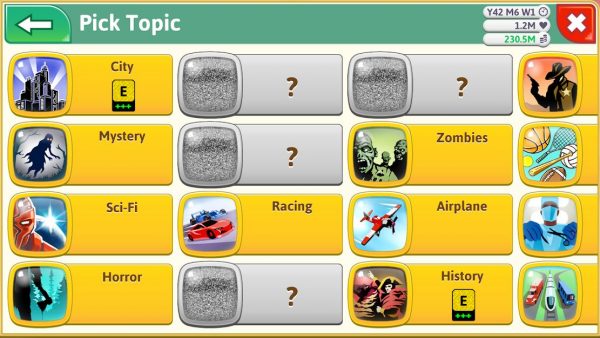
Another thing you have to think about is the topic of your game. At the start, you would have the option of four random topics available to you. You can slowly increase the number of topics by researching them for 10 research points a pop. Remember to never release games with the same topics in a row since the second game will do badly in sales and reviews.
3. Know Your Target Audience
You can target your games to audiences after researching the option to do so after the first week of the first month of your third year in the game. Targeting your game lets you create games for youth, everyone, and mature audiences. After researching this option, you will be forced to choose from one of the three target groups for each game.
4. Be Aware of the Game Systems You Release Games To
Since this is a game based on the 1980s, you first have two game systems available to release your game on, the IBM PC-like PC and the Commodore 64-like Govodore 64. As time goes by and the market expands to more systems and consoles, you would have the option to create games on that system. Game systems in the game do not just get more diverse as the old ones are also made obsolete. Due to that, be aware of which console or gaming system you release games to since its market share may not be that big.
5. Do Not Buy Licenses Unless You Badly Needed
You would have to first pay a licensing fee to access a console or game system’s market aside from the PC and G64. These license fees differ depending on the console. It could go as low as $20,000 to as high as a few hundred thousand. Remember to buy licenses only when you need them and to be mindful of the “lifetime” of each gaming system.
6. Familiarize with the Game Development Stages
Every time you decide to “create” a game after choosing what to make, you have to go through three “stages” of its development. These stages will let you decide what to focus on with your game. The first stage decides how much time you would allocate to the game’s engine, gameplay, and story/quests. Your second stage lets you choose between dialogue, level design, and AI. And finally, the last stage involves choosing between world design, graphics, and sound. Your focus for each of the four attributes of the game would change depending on what type of game it is you’re working on. We will explain these later on.
7. Create Game Reports
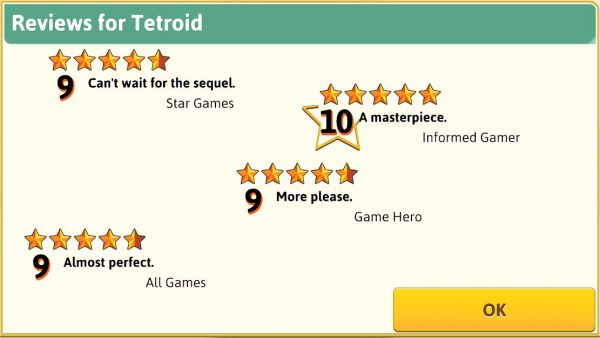
Create game reports when you can. While you can only create one per game released, having yourself and your employees create one helps you gather up research points. These reports also give you insight into what genres and topics work with each other and with the console/platform you have chosen them for. These are usually represented in “+” and “-” marks, with +++ being the best and — as the worst.
8. Get Rid of Bugs
During the “game design” phase, you would see different bubbles come out of your character and your workers. These bubbles add up to the current game’s bugs, design, and technology score. The three factors weigh a lot on how favorably your game is reviewed and how much it would sell. We will explain a bit more on research later on in this Game Dev Tycoon guide.
9. Follow Platform News
Look out for these quick “updates” on the gaming market. These show the trend on not just what consoles gamers are on. They also show possible genres and topics for games people want to play with as well.
10. Do Accept Contract Work You Can Finish
You have the chance to get contracted work after you have earned a set amount in-game. While you do have a few options to choose from, it does not mean that you or your team can actually meet the deadline for the work. Be careful with your team’s usual output and decide only on work you can finish. Do note that over time, these projects get bigger and bigger so make sure your team is experienced enough for them.
11. Hire Staff and Know Their Attributes
After you have earned your first $1,000,000, you will be given the option to move into a bigger studio. This move will allow you to hire other coders and programmers to help you make your company’s games. While a bit expensive, it is good to have more people to create your games. The staff you hire have two different skills, tech, and design.
While interviewing for a new staffer, you can set how much advertising budget you are allocating for the new position and have filters in place to define their skills. You can filter them by complex algorithms, showreel, and game demo. The first filters out applicants that have good tech scores. The second gives you staffers with design scores. The third one, on the other hand, gives you a mix of both scores.
Other attributes each individual staffer has are speed, research, and level attributes. The speed statistic refers to how fast the “bubbles” pop up when they are working. Research, meanwhile, increases the number of research bubbles they create. Their level allows them to specialize in roles after they reach certain thresholds.
12. Do Your Research and Innovate
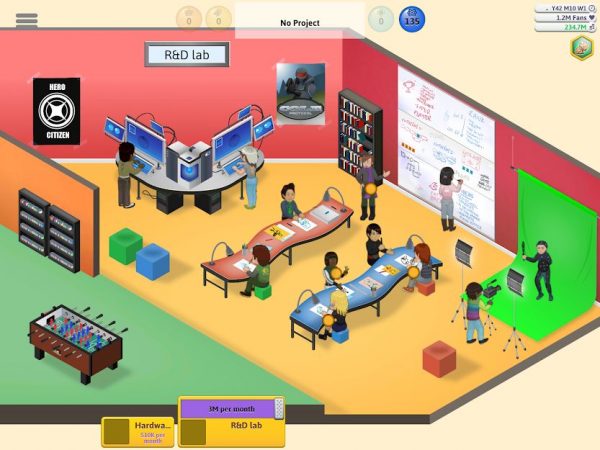
As you move along in the game, you will find that technology advances along with your playthrough. From the old Commodore-like PCs to newer Xbox-like consoles, you also have to change your game creation with the times. This is the point when research comes into play. The research tab allows you to not just research more topics but also access specific “technologies” and innovations in the gaming world.
These research opportunities are sometimes “time” locked. Others can only be accessed if you have other factors like the number of fans or if you made a game engine. Below is a table of some of the important research “unlocks.”
| Technology/Feature | How to Unlock |
| Target Audience Metric | Reach game time Y3 M1 W1. |
| Casual Games | Reach game time Y3 M11 W1. |
| Marketing | Reach game time Y4 M5 W2. |
| Sequel Games | Reach game time Y8 M6. |
| Multi-Genre Games | Reach game time Y12 M8. |
| Research and Development Lab | Must have a Technology Specialist staffer. |
| Hardware Lab | Must have a Technology Specialist and research Custom Hardware in the R&D Lab. |
| Internet Opportunities | Upon R&D Lab construction. |
| Expansion Packs | Must have researched MMO and sold an MMO game. |
| Company Game Convention | Reach 1M fans or Y23. |
| License Game Engines | Create 10 custom engines. |
| AAA Game | Have a large game with a score of 10. |
| Marketing Campaign | Create a AAA game. |
Game Dev Tycoon Story Combos
Now we are at the part of the Game Dev Tycoon guide where you would be bombarded by statistics and charts. Before you drown in the numbers with plus and minus signs, we will explain a little bit about what they mean and why you should care about them.
Combos are the so-called “meat” of Game Dev Tycoon since every title you make in-game is dependent on the combination of genre, topic, audience target, and game system you would release it on. As we said earlier, these combinations are ranged from a good +++ score to a bad — score. Knowing and not knowing these combo scores could mean the success or failure of your game. That said, let us move on to the charts!
Topics and Genres Chart
This chart shows the relationship between topics, genres, and your target audiences. Games you make in Game Dev Tycoon using this chart will rate better than making a game blindly.
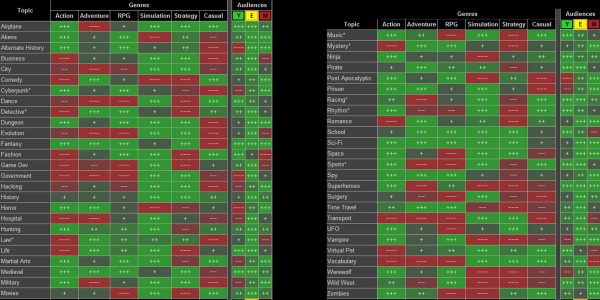
Systems and Genres Chart
Now to the systems and genres chart. This chart shows what genres of games work for which games system or console. You can use this to determine what games would work for each system regardless of the system’s market share. If you want better sales for your games, though, it is better to sell games on systems with decent market shares.
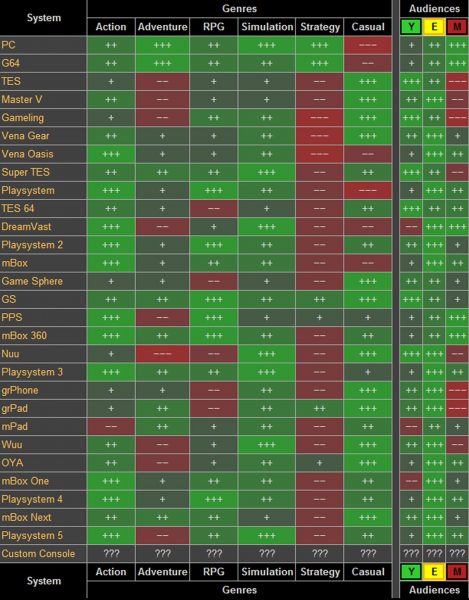
Genre and Development Stage Chart
Second to the last chart: the genre and development stage chart. This shows you which of the nine game design factors you should focus on when making a specific genre of game. You use this in conjunction with the systems and topics charts we showed previously.
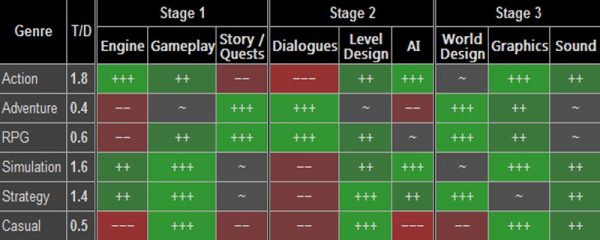
Dual-Genre and Development Stage Chart
And finally, the last chart is for after you researched dual-genre games. As with the previous chart, this one shows you which factors to focus on during the three stages of game development.
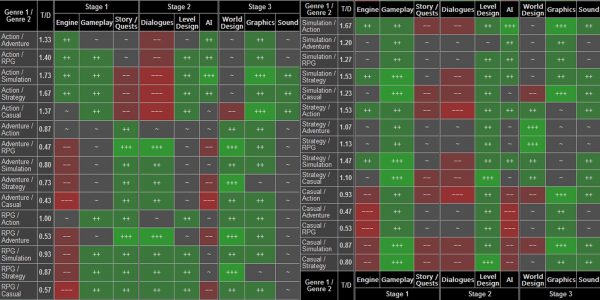
Other Games Like Game Dev Tycoon
We hope you have as much fun with the game as we did. Just remember that Game Dev Tycoon is the kind of game where it is okay to fail and restart from scratch. Most of the data in our statistics chart are available in-game after you have unlocked them by discovering them through game reports. You can only see these combination scores if you have hints turned on, though, so do not forget to turn that on in your settings.
Aside from being a paid Android game, Game Dev Tycoon is also similar to a few other games in different genres. These include restaurant games like Food Street, building games like Fallout Shelter, and idle games like bee factory.
